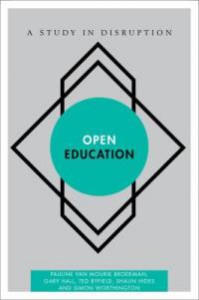“Teacher Evaluation: The Charge and the Challenges” – Kate O’Hara
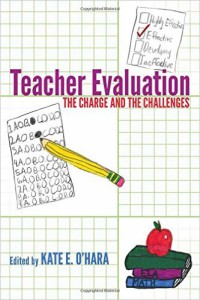 Fueled by the outrage she feels towards the onslaught of attacks on public education, the current wave of excessive standardized testing of students and the push for limited and biased teacher evaluation practices, author Kate O’Hara fights back in her new book “Teacher Evaluation: The Charge and the Challenges”. This book aims to provide a critique of teacher evaluation systems; to display the connections and disconnections between pre-service and in-services classroom practices and evaluation methods; and to address the possibilities for change. O’Hara provides numerous perspectives and arguments by compiling the works of over 15 contributors, all of whom are educators, educational consultants, or curriculum consultants.
Fueled by the outrage she feels towards the onslaught of attacks on public education, the current wave of excessive standardized testing of students and the push for limited and biased teacher evaluation practices, author Kate O’Hara fights back in her new book “Teacher Evaluation: The Charge and the Challenges”. This book aims to provide a critique of teacher evaluation systems; to display the connections and disconnections between pre-service and in-services classroom practices and evaluation methods; and to address the possibilities for change. O’Hara provides numerous perspectives and arguments by compiling the works of over 15 contributors, all of whom are educators, educational consultants, or curriculum consultants.
“Loose Parts: Inspiring Play in Young Children”—Lisa Daly and Miriam Beloglovsky
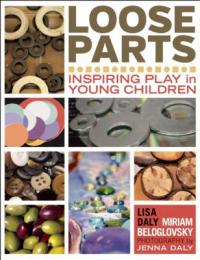 Authors Daly and Beloglovsky, both experienced early childhood educators, have created a useful guide on how to use common items in fun and interactive ways. They describe “loose parts” as any materials that children can move, manipulate and change within their play, and highlight that loose parts capture children’s curiosity and give their imagination free reign. The book is organized into four main sections of concepts children can learn by engaging with real materials, all of which are filled with vivid pictures that demonstrate a variety of loose parts in real early childhood settings. The authors demonstrate the endless possibilities of learning and fun that can be had by incorporating loose parts into children’s play.
Authors Daly and Beloglovsky, both experienced early childhood educators, have created a useful guide on how to use common items in fun and interactive ways. They describe “loose parts” as any materials that children can move, manipulate and change within their play, and highlight that loose parts capture children’s curiosity and give their imagination free reign. The book is organized into four main sections of concepts children can learn by engaging with real materials, all of which are filled with vivid pictures that demonstrate a variety of loose parts in real early childhood settings. The authors demonstrate the endless possibilities of learning and fun that can be had by incorporating loose parts into children’s play.
“The Wrong Emphasis: Learn What Adults Teach”—John Elling Tufte
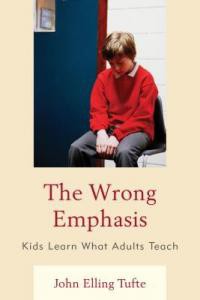 In his latest work, The Wrong Emphasis, Tufte adds a captivating perspective to the discussion on how an over-reliance on assessment lessens the value of the educational experience. Tufte argues that the current education system within the United States overemphasizes the need for K-12 students to achieve high scores on standardized testing, and GPAs that become irrelevant when students enter universities and are faced with harsher realities. His book is presented in four parts designed to display an examination of the current status of public education in America, the associated political landscape, the latest philosophies aimed at improving test scores, as well as advice for parents and educators.
In his latest work, The Wrong Emphasis, Tufte adds a captivating perspective to the discussion on how an over-reliance on assessment lessens the value of the educational experience. Tufte argues that the current education system within the United States overemphasizes the need for K-12 students to achieve high scores on standardized testing, and GPAs that become irrelevant when students enter universities and are faced with harsher realities. His book is presented in four parts designed to display an examination of the current status of public education in America, the associated political landscape, the latest philosophies aimed at improving test scores, as well as advice for parents and educators.
“Jumpstart! Thinking Skills and Problem Solving: Games and Activities for Ages 7-14”—Steve Bowkett
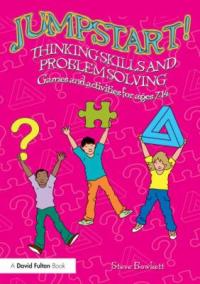 The newest edition to our Jumpstart collection, Jumpstart! Thinking Skills and Problem Solving presents a collection of insights, ideas, activities, and games that aim to develop children’s ability to think more effectively. The book focuses on problem-solving in the areas of literacy, science, philosophy and emotional resourcefulness. Specifically designed to work within the guidelines of the new curriculum, the book will help children explore and develop a range of problem-solving and independent thinking skills that can be applied both in school, and more broadly in their lives.
The newest edition to our Jumpstart collection, Jumpstart! Thinking Skills and Problem Solving presents a collection of insights, ideas, activities, and games that aim to develop children’s ability to think more effectively. The book focuses on problem-solving in the areas of literacy, science, philosophy and emotional resourcefulness. Specifically designed to work within the guidelines of the new curriculum, the book will help children explore and develop a range of problem-solving and independent thinking skills that can be applied both in school, and more broadly in their lives.
The dramatic growth in the provision of free online education has brought forward concerns regarding the effect of free online education on the university, and whether this new form of education will lead to a two-tier system in which students who cannot afford to attend a traditional institution will have to settle for online, second-rate alternatives. Open Education provides a political context for various online education services, such as Massive Open Online Courses (MOOCS), TED Talks, and Wikiversity, as well as self-organized “pirate” libraries. It questions many ideas that open education projects take for granted, including Creative Commons, and proposes a different model for the university and education in the twenty-first century.

